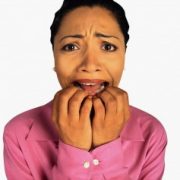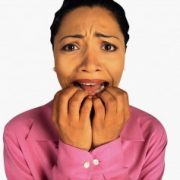How To Beat Test Anxiety
Been a hot summer here in Southern California. It’s still hot even though today, 6 days into fall, mornings are cooler and days are getting shorter. One thing I’ve noticed, traffic is heavier because everyone is back to school.
When I was in school, I pretty much skated by, hardly studied, and did pretty good. It was the same in high school. In college, however, I suffered the consequences of no real study habits. I would cram the night before, like I always did, but when it came time to recall the information, my mind went blank. The problem was that when I did study, I didn’t do much better. Fact is, I just wasn’t used to being challenged by exams and when I was, I got shut down.
Hey, I was lazy! I admit. But can you imagine blanking out, shutting down, and being gripped by anxiety after thorough preparation and study? It’s called test anxiety. A 2006 U.S. Department of Education-funded study conducted by the Institute of HeartMath and Claremont Graduate University with 980 10th-grade students found that 61% of all students reported being affected by test anxiety. This is where you can get so nervous and anxious about doing well (or just passing), that performance on a test is negatively affected. If you can see how a college final can produce this type of anxiety, then imagine having this anxiety while taking the bar exam, or an exam for licensure, where the stakes are high and both money and time may have been heavily invested.
Test anxiety is a form of performance anxiety, where someone is extremely nervous about having to produce a result in a limited time period or in front of people who are judging them. Stage fright, fear of public speaking and “choking” in sports performance fall into this category.
Of course, it’s normal to have some type of nervousness about taking a test and in fact, this nervousness can be helpful by getting us into a space where we are pumped up to do well. When this nervousness escalates into anxiety, however, it can not only interfere with recall of information but may create a reaction so intense that it may cause some people to give up taking the exam entirely, or to continue putting it off until “someday”.
Symptoms of this type of anxiety are similar to most other forms of anxiety reactions: rapid heartbeat, sweaty palms, shortness of breath, shakiness, confusion, or other physical aches or pains.
In my work as a hypnotherapist with people who are challenged by test anxiety, I notice that many of these people share similar characteristics, such as being highly stressed, having perfectionist tendencies, or being worried a lot. Most instances of test anxiety can be dealt with in just a few hypnotherapy sessions, but here are some suggestions you can put to use right away.
* Diet can affect your ability to think and recall information. If you are skipping meals or eating meals or snacks high in carbs while studying for an exam, then you may be experiencing episodes of low blood sugar (glucose). Since the organ the uses the most glucose is the brain, a balanced diet can be helpful in creating optimal brain power. Have healthy snacks while you study.
*Sleep seems to go by the wayside when students are preparing for exams. Plan your study time for when you feel the most alert, which for most people is not usually late at night. But if that works for you, then make sure you’re getting the amount of sleep that’s right for you. It’s probably more than you think. Kind of makes sense to be well rested in the days leading up to a major exam, no?
*Lack of preparation can cause test anxiety. Last minute cramming may leave you feeling like you are not ready, and that can be scary. Pay attention to time management, organizing your schedule to give yourself teh best conditions for learning. Decide ahead of time when, and for how long you will study.
*Watch your self talk. Avoid scaring yourself with conversations such as ” I know I’m going to just blank out right in the middle of the test!” Give yourself encouragement and support. Use positive affirmations in the days and weeks leading up to the exam. (See my previous post of June 29th )
*Mental visualization can be one of the most effective techniques you can use to “rehearse” taking the test while feeling calm, relaxed and comfortable. See yourself walking out of the testing location feeling good about your performance.
*Extreme self care might be getting a massage the day before the exam to release excess tension and stress. Get a good nights sleep the night before the exam, and don’t even thing about showing up without eating a good meal with protein. Daily walking or any type of exercise can also be a great stress reliever. Remember, anxiety comes from prolonged stress and tension. Find ways to release it.
For the most part, test anxiety is a learned response, and if you can learn something you can unlearn it and learn a different reaction. If you or someone you know is blocked from success by an inability to do well on exams, I can help. I’ll give anybody coming in for test anxiety their second session for no charge after their first paid session at my regular rate. Have a great fall!
If you liked this post, please leave a comment and/or share it with your social networks.
Tman
Ted A. Moreno Personal/Small Business Coach Certified Hypnotherapist Specializing in Your Success www.TedMoreno.com (626) 826-0612





If you get straight “A”s you think too much.
Always loved that line from Billy Joel…